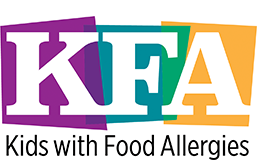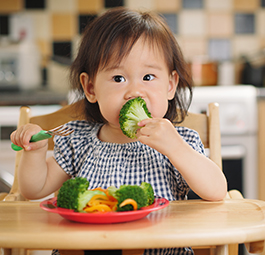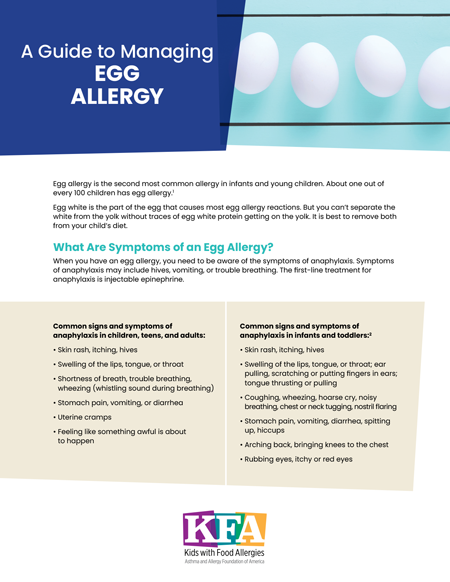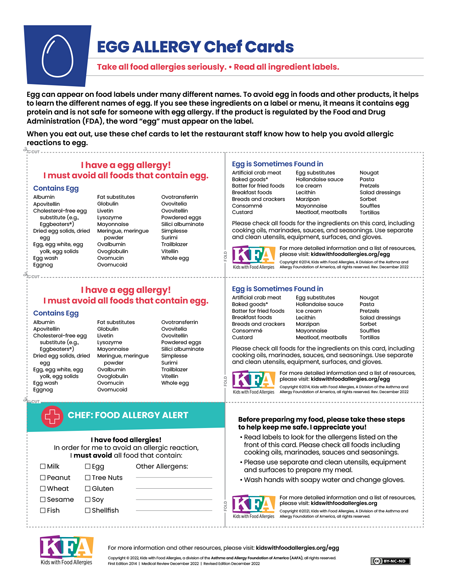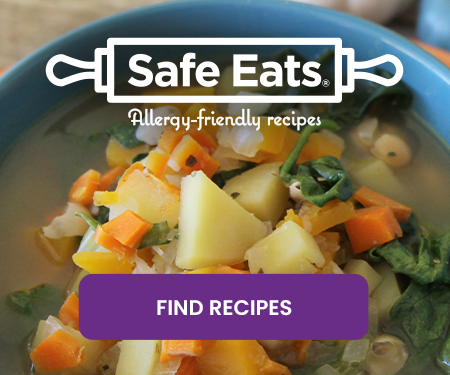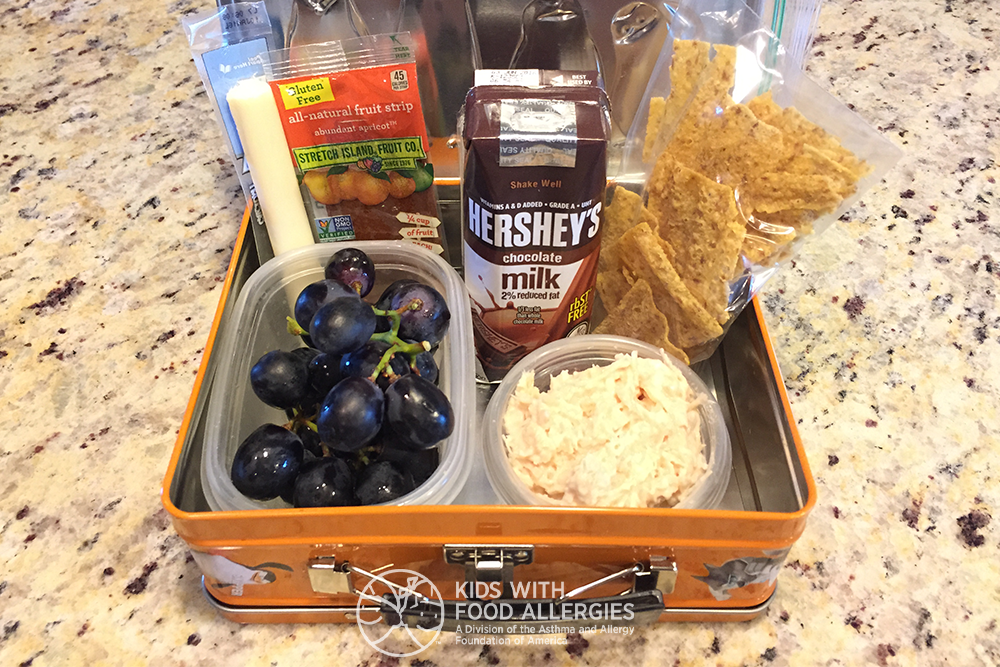Living with Food Allergies

Egg Allergy
Egg allergy is the second most common allergy in infants and young children. About 1.3% of children under age 5 in the U.S. have an egg allergy. For kids over age 5, the rate is 0.9%.1 (This means about 1 out of every 100 children has egg allergy.)
Children diagnosed with an egg allergy must remove egg and egg-containing foods from their diet. This includes both egg whites and egg yolk. Some children getting food allergy treatment may eat controlled amounts of egg under the supervision and careful monitoring of an allergist to build up a tolerance to egg allergens. This approach has been shown to be effective in desensitizing a large number of children with egg allergies.
Egg White vs. Egg Yolk
Egg white is the part of the egg that causes most egg allergy reactions, but egg yolk can still contribute to allergic reactions. There is no safe way to separate the egg white from the egg yolk. Because of this, It is best to remove both from your child’s diet.
Closed
What are the symptoms of egg allergy?
An egg allergy is usually an immunoglobulin-E-mediated (IgE-mediated) allergy. This means your immune system makes antibodies called IgE antibodies. These IgE antibodies react with egg proteins and cause symptoms. This has the potential to cause a serious allergic reaction called anaphylaxis [anna-fih-LACK-sis].
When you have an egg allergy, you need to be aware of the symptoms of anaphylaxis. Symptoms of anaphylaxis may include hives, vomiting, or trouble breathing. The first-line and main treatment for anaphylaxis is epinephrine.
Signs and symptoms of anaphylaxis in children, teens, and adults include:
- Skin rash, itching, hives
- Swelling of the lips, tongue, or throat
- Shortness of breath, trouble breathing, wheezing
- Stomach pain, vomiting, diarrhea
- Feeling like something awful is about to happen
Common signs and symptoms of anaphylaxis in infants and toddlers include:2
- Skin rash, itching, hives
- Swelling of the lips, tongue, or throat
- Stomach pain, vomiting, diarrhea, spitting up
- Tongue thrusting, tongue pulling, licking lips repeatedly, ear pulling
- Arching back, bringing knees to the chest
- Coughing, wheezing, hoarse voice, belly breathing, chest or neck “tugging”
- Rubbing eyes, itchy or red eyes
How do doctors diagnose egg allergy?
A doctor will do a physical exam and ask questions about medical history. They will ask about what happens when your child eats egg. They will want to know how soon symptoms appeared after eating and if and how you treated it and if the treatment was effective. They may order allergy testing to help confirm the diagnosis. A skin prick test or a blood test known as a specific IgE test may be used by your doctor to help diagnose this food allergy.
Your doctor may also recommend a test called an oral food challenge. This test is done by an allergist in a medical setting that equipped to treat an allergic reaction. It is the gold standard to diagnose a food allergy or confirm if your child has outgrown the allergy. Sometimes an oral food challenge is necessary when your child’s medical history is not entirely clear. Also, a positive skin or blood test to egg may not mean your child is allergic to egg. In people who do not have a clear history of having a reaction to egg, an oral food challenge is the only way to truly confirm the allergy.
How can I prevent egg allergy reactions?
Egg, especially chicken egg, is a common ingredient that can be found in many types of food. Foods that may contain egg include breads and baked goods, sauces, pasta, casseroles, meat that is breaded, and so much more.
The only way to avoid an allergic reaction is to completely remove egg from your child’s diet. This includes all egg products.
But you can successfully manage your egg allergy with education and an allergy management plan. This can be done by:
- Working with your doctor
- Reading labels
- Being aware of cross-contact (when foods come into contact with each other and may transfer an allergen into a food that shouldn’t have it)
- Clearly communicating with school staff, people who prepare your food, and babysitters and other caregivers
How do I read labels for egg?
Always read the entire ingredient label to look for the names of egg. Egg ingredients may be within the list of the ingredients, or egg could be listed in a “contains: egg” statement beneath the list of ingredients. This is required by the federal Food Allergen Labeling and Consumer Protection Act (FALCPA) and the Food Allergy Safety, Treatment, Education, Research and Research (FASTER) Act, enacted in 2022.
FALCPA requires that all packaged foods regulated by the FDA must list “egg” clearly on the ingredient label if it contains egg. Labels also must be labeled clearly if they contain egg from chickens, ducks, geese, quail, and other fowl. The ingredients list must list the animal the egg comes from. For example, it must say “duck egg” or “quail egg” and not just “egg.”
When reading labels for egg, look for egg to be labeled either in parentheses after an ingredient in the ingredient list or in a statement under the ingredient list. For example:
- Ovoglobulin (egg)
- Contains: Egg
Sometimes egg may appear in bold print in the ingredient list too. To avoid egg in foods and other products, it helps to learn the different names of egg (see our list below).
Some food companies put advisory statements on their labels, such as “may contain egg” or “made in a facility with egg.” They are not required to put advisory statements on labels by any federal labeling law. They can be confusing and may not tell you the actual risk of the product. If you have questions about precautionary advisory labels, talk with your doctor.
If a food item does not have a label, you can’t read it, or you have any doubts, don’t eat it. Always read the entire label every time. Food companies may change their recipes.
FALCPA does not apply to all foods and everything that may contain egg though. This means egg could be “hidden” in products or listed under other names. Or you may not be able to find out the exact ingredients. These foods and products do not have to have egg clearly listed or labeled and may contain egg:
- Arts and crafts supplies
- Prescription and over-the-counter drugs
- Cosmetics and personal care items (such as makeup, lotions, and soaps)
- Alcohol
- Toys
- Pet or animal food
- Food served in restaurants, cafeterias, or other food service providers
There are many different names for egg. When shopping and cooking, have a list of the different names of egg on hand to check food packages for egg ingredients. We have compiled a list of the different names of egg below. You can also download and print Kids with Food Allergies’ (KFA) Guide to Managing Egg Allergy and Chef Cards.
Most states in the U.S. do not have regulations regarding food allergies and restaurants. Ingredients in restaurant foods may vary. Cross-contact is also more likely. This occurs when an egg-containing food comes into contact with another food that does not usually contain egg.
Many restaurants are becoming more food allergy aware though. Look for places that have food allergy policies and allergy menus. Always tell the wait staff about your food allergies. Give the staff a chef card that alerts them to your allergy and lists egg ingredients for them to watch for.
Egg ingredient list
The following ingredients found on a label indicate the presence of egg. All labels should be read carefully before consuming a product, even if your child has safely eaten it in the past.
CONTAINS EGG*
Albumin
Apovitellin
Cholesterol-free egg substitute (such as Eggbeaters®)
Dried egg solids, dried egg
Duck egg*
Egg, egg white, egg yolk, egg solids
Egg wash
Eggnog
Fat substitutes
Goose egg*
Globulin
Livetin
Lysozyme
Mayonnaise
Meringue, meringue powder
Ovalbumin
Ovoglobulin
Ovomucin
Ovomucoid
Ovotransferrin
Ovovitelia
Ovovitellin
Powdered eggs
Quail egg*
Silici albuminate
Simplesse
Surimi
Turkey egg*
Vitellin
Whole egg
*Most of these ingredients will be from chicken egg. If they come from other birds, such as ducks, geese, quail, and other fowl, the type of animal must be noted on the label. For example, it must say “duck egg” or “quail egg” and not just “egg.”
If your child has an allergy to chicken egg, they may be able to eat eggs from other birds. Talk with your child’s allergist about what types of eggs your child should avoid.
EGG IS SOMETIMES FOUND IN
Artificial crab meat
Artificial flavoring
Asian dishes (such as fried rice)
Baked goods*
Batter for fried foods
Breakfast foods (such as pancakes, waffles, French toast)
Breads (some may have an egg glaze; quick breads may contain eggs)
Cakes
Chips
Consommé
Crackers
Custard
Egg substitutes
Hollandaise sauce
Ice cream
Lecithin
Marzipan
Marshmallows
Mayonnaise
Meatloaf, meatballs
Meringue or meringue powder
Natural flavoring
Nougat
Pasta
Pretzels
Salad dressings
Sorbet
Souffles
Specialty coffee drinks (such as coffees with foam like cappuccino)
Tortillas
If the product is regulated by the FDA, the word “egg” must appear on the label.
*Baked egg
Some people with an egg allergy may be able to eat eggs in baked foods. To find out if your child can eat baked egg, talk with your allergist.
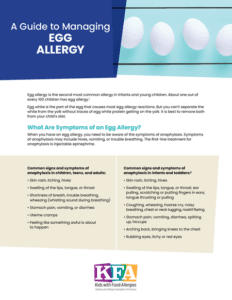 Download or Order Print Copies: “A Guide to Managing Egg Allergy” (Includes chef cards and more) |
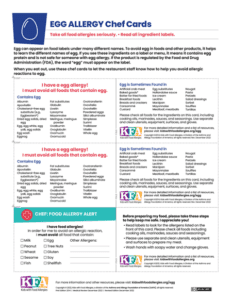 Download or Order Print Copies: Egg Allergy Chef Cards |
Does my child need to avoid foods related to chicken eggs?
Cross-reactivity occurs when the proteins in one food are similar to the proteins in another. When that happens, the body’s immune system sees them as the same. Most people with an allergy to egg can eat chicken meat without any symptoms. Experts believe that cross-reactivity between hen (chicken) egg white and turkey, duck, goose, and seagull egg white is rare.3
Can my child with egg allergy eat baked egg?
Heating egg to a certain temperature for a set time can change the structure of the egg protein (known as denaturing the protein). The changes may be enough to trick the immune system into not attacking the egg. A majority of children with egg allergy can tolerate eating small amounts of baked egg. This may allow a child to safely eat egg that is baked into foods like muffins or breads. Some studies show that kids who tolerate eating baked eggs are more likely to outgrow their egg allergy.4
To find out if your child can eat baked egg, your allergist may perform a test called an oral food challenge. This should be done in an allergist’s office equipped to treat an allergic reaction. Talk with your allergist before trying the ingestion of baked egg products at home.
How can I substitute eggs in recipes?
It is usually possible to replace eggs in a recipe. Egg replacement products have come a long way, but some are more costly than others.
Do not give your child with an egg allergy low cholesterol egg substitutes such as EggBeaters®. These types of substitutes are made from egg ingredients. Always read labels to confirm that you are using a safe product.
Depending on the type of recipe, some egg replacements work better than others. In baked goods, eggs provide structure (binding), texture, taste, leavening (to help the food rise), and color. Each of these functions may require a different type of substitute.
For example, it is common to use egg wash on baked bread or dessert products to give them a shiny brown crust. In this case, acceptable substitutions are cow’s milk, soy milk, watered down agave nectar, or corn syrup, among others, if your child isn’t allergic to these foods.
Learn more about egg substitutes.
How can I make sure my child gets enough nutrition on an egg-free diet?
Eggs provide a source of quality protein, as well as iron, biotin, folacin, pantothenic acid, riboflavin, selenium, and vitamins A, D, E, and B12. Your child will still easily get an adequate amount of protein when egg must be eliminated if he is not allergic to other protein sources, such as: milk, meat, poultry, fish, nuts, and legumes. Selenium and vitamin B12 can also be obtained from meat. Folacin can be found in legumes, fruits, and leafy greens. If your child eats a variety of other foods, they should be able to get proper nutrition on an egg-free diet.
When your child avoids foods containing egg, they may not have important nutrients in their diet. For example, most baked goods are made with enriched and fortified flour, which contains B vitamins and iron. Did your child normally eat a variety of baked goods prior to developing an egg allergy? If so, you will need to provide calories, B vitamins, iron, and additional nutrients from other egg-free sources.
| NUTRIENTS LOST WHEN AVOIDING EGG |
SUGGESTED ALTERNATE SOURCES (if not allergic) |
| Protein, iron, biotin, folacin, riboflavin, vitamins A, D, E, B12 | Increase other protein foods such as meat, fish, poultry, legumes, dairy (if safe for your child); fruit, vegetables, leafy greens, and enriched grains |
Will my child outgrow their egg allergy?
Around 50% of people with an egg allergy outgrow their allergy by age 6. About 70% will outgrow it by the end age 7.5
Can my child with an egg allergy get a flu vaccine?
Anyone who has or has had an egg allergy can get a flu vaccine.
The flu is a contagious respiratory illness caused by influenza viruses. It can cause mild to severe illness. Serious complications from the flu are possible. It’s important that anyone 6 months and get a flu vaccine.
Most versions of the flu shot and nasal spray vaccines can contain a tiny amount of egg protein. But studies show that the amount is so small it is unlikely that you will have a severe allergic reaction to the vaccine if you have an egg allergy.
Is there a treatment for egg allergy?
One of the most common ways to prevent egg allergy reactions is to avoid egg completely. But some research is being done on egg allergy treatments, such as oral immunotherapy (OIT).
Many doctors have been offering OIT treatment using foods in various forms, such as a liquid, flour, or the actual food itself. Treatment may include feeding your child baked egg. Some studies show that kids who tolerate eating baked eggs are more likely to outgrow their egg allergy.4
These methods are not approved by the FDA. Talk with your child’s doctor about the most appropriate OIT option for your child.
There are many known side effects or possible adverse reactions to OIT. Talk with your allergist to see if this treatment might be right for your child with food allergies and family.
In February 2024, the FDA approved Xolair® (omalizumab) for the treatment of food allergies.6 Xolair is a biologic medicine given by injection every 2 to 4 weeks. It can reduce your child’s risk of an allergic reaction if they accidentally eat their food allergen.
Talk with your allergist to see if OIT or Xolair might be right for your child and family.
Food Allergy Fact
Feeding common food allergens to babies starting between 4-6 months of age lowers their risk of developing food allergy.
Medical Review: May 2025 by John James, MD
References
- Samady, W., Warren, C., Wang, J., Das, R., & Gupta, R. S. (2020). Egg allergy in US children. The Journal of Allergy and Clinical Immunology: In Practice, 8(9), 3066–3073.e6. https://www.jaci-inpractice.org/article/S2213-2198(20)30418-9/abstract.
- Pistiner, M., Mendez-Reyes, J. E., Eftekhari, S., Carver, M., Lieberman, J., Wang, J., & Camargo, C. A. (2021). Caregiver-Reported Presentation of Severe Food-Induced Allergic Reactions in Infants and Toddlers. The Journal of Allergy and Clinical Immunology: In Practice, 9(1). https://doi.org/10.1016/j.jaip.2020.11.005.
- American Academy of Allergy, Asthma and Immunology. (2013, April 1). Allergenic Cross-Reactivity Between Hen and Duck Egg. Ask the Allergist. Retrieved March 28, 2025 from: https://www.aaaai.org/allergist-resources/ask-the-expert/answers/old-ask-the-experts/cross-reactivity-hen-duck-egg.
- Leonard, S. A., Sampson, H. A., Sicherer, S. H., Noone, S., Moshier, E. L., Godbold, J., & Nowak-Węgrzyn, A. (2012). Dietary Baked Egg Accelerates Resolution Of Egg Allergy In Children. The Journal of Allergy and Clinical Immunology, 130(2), 473–480.e1. https://doi.org/10.1016/j.jaci.2012.06.006.
- Sicherer, S. H., Wood, R. A., Vickery, B. P., Jones, S. M., Liu, A. H., Fleischer, D. M., Dawson, P., Mayer, L., Burks, A. W., Grishin, A., Stablein, D., & Sampson, H. A. (2014). The natural history of egg allergy in an observational cohort. The Journal of Allergy and Clinical Immunology, 133(2), 492–499.e8. https://doi.org/10.1016/j.jaci.2013.12.1041.
- Wood, R. A., Alkis Togias, Sicherer, S. H., Shreffler, W. G., Kim, E. H., Jones, S. M., Donald Y.M. Leung, Vickery, B. P., J. Andrew Bird, Spergel, J. M., Iqbal, A., Olsson, J., Ligueros-Saylan, M., Uddin, A., Calatroni, A., Charmaine Marquis Huckabee, Rogers, N. H., Yovetich, N., Dantzer, J., & Mudd, K. (2024). Omalizumab for the Treatment of Multiple Food Allergies. The New England Journal of Medicine, 390(10). https://doi.org/10.1056/nejmoa2312382.
